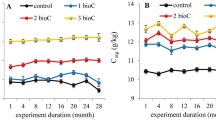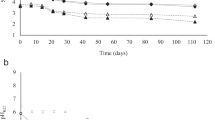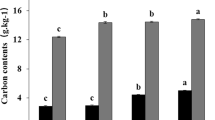Abstract
ORGANIC matter originating from the Bh horizon of a podzol soil is of interest for two reasons. First, because of the presence of a large number of functional groups it reacts readily with metals, metallic oxides and possibly clays and can therefore serve as a model for metallo-organic reactions in soils. Secondly, so far as organic chemists are concerned, its low molecular weight makes it a suitable starting material for the investigation of the chemical structure of soil humic acids.
This is a preview of subscription content, access via your institution
Access options
Subscribe to this journal
Receive 51 print issues and online access
$199.00 per year
only $3.90 per issue
Buy this article
- Purchase on Springer Link
- Instant access to full article PDF
Prices may be subject to local taxes which are calculated during checkout
Similar content being viewed by others
References
Schnitzer, M., and Desjardins, J. G., Soil Sci. Soc. Amer. Proc., 26, 362 (1962).
Purdie, T., and Irvine, J. C., J. Chem. Soc. Trans., 83, 1021 (1903).
Author information
Authors and Affiliations
Rights and permissions
About this article
Cite this article
BARTON, D., SCHNITZER, M. A New Experimental Approach to the Humic Acid Problem. Nature 198, 217–218 (1963). https://doi.org/10.1038/198217a0
Issue Date:
DOI: https://doi.org/10.1038/198217a0
This article is cited by
-
Changes in the chemical composition of the organic carbon in Spartina alterniflora litter during decomposition in saltmarsh sediments
Journal of Soils and Sediments (2021)
-
An appreciation of the contribution of Frank Stevenson to the advancement of studies of soil organic matter and humic substances
Journal of Soils and Sediments (2018)
-
Chemical structure of humic substances
Nature (1977)
-
Effect of a soil fulvic acid on stem elongation in peas
Plant and Soil (1970)
-
Effects of a Soil Humic Compound on Root Initiation
Nature (1967)
Comments
By submitting a comment you agree to abide by our Terms and Community Guidelines. If you find something abusive or that does not comply with our terms or guidelines please flag it as inappropriate.



